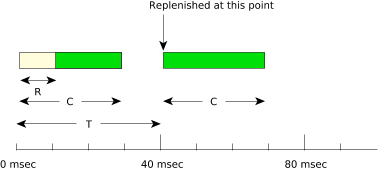The sporadic scheduling policy is generally used to provide a capped limit on the execution time of a thread within a given period of time.
This behavior is essential when Rate Monotonic Analysis (RMA) is being performed on a system that services both periodic and aperiodic events. Essentially, this algorithm allows a thread to service aperiodic events without jeopardizing the hard deadlines of other threads or processes in the system.
As in FIFO scheduling, a thread using sporadic scheduling continues executing until it blocks or is preempted by a higher-priority thread. And as in adaptive scheduling, a thread using sporadic scheduling will drop in priority, but with sporadic scheduling you have much more precise control over the thread's behavior.
Under sporadic scheduling, a thread's priority can oscillate dynamically between a foreground or normal priority and a background or low priority. Using the following parameters, you can control the conditions of this sporadic shift:
- Initial budget (C)
- The amount of time a thread is allowed to execute at its normal priority (N) before being dropped to its low priority (L).
- Low priority (L)
- The priority level to which the thread will drop. The thread executes at this lower priority (L) while in the background, and runs at normal priority (N) while in the foreground.
- Replenishment period (T)
- The period of time during which a thread is allowed to consume its execution budget. To schedule replenishment operations, the POSIX implementation also uses this value as the offset from the time the thread becomes READY.
- Max number of pending replenishments
- This value limits the number of replenishment operations
that can take place, thereby bounding the amount of system
overhead consumed by the sporadic scheduling policy.
Note: In a poorly configured system, a thread's execution budget may become eroded because of too much blocking—i.e., it won't receive enough replenishments.
As the following diagram shows, the sporadic scheduling policy establishes a thread's initial execution budget (C), which is consumed by the thread as it runs and is replenished periodically (for the amount T). When a thread blocks, the amount of the execution budget that's been consumed (R) is arranged to be replenished at some later time (e.g., at 40 msec) after the thread first became ready to run.
 Figure 1. A thread's budget is replenished periodically.
Figure 1. A thread's budget is replenished periodically.At its normal priority N, a thread will execute for the amount of time defined by its initial execution budget C. As soon as this time is exhausted, the priority of the thread will drop to its low priority L until the replenishment operation occurs.
Assume, for example, a system where the thread never blocks or is never preempted:
 Figure 2. A thread drops in priority until its budget is replenished.
Figure 2. A thread drops in priority until its budget is replenished.Here the thread will drop to its low-priority (background) level, where it may or may not get a chance to run depending on the priority of other threads in the system.
Once the replenishment occurs, the thread's priority is raised to its original level. This guarantees that within a properly configured system, the thread will be given the opportunity every period T to run for a maximum execution time C. This ensures that a thread running at priority N will consume only C/T of the system's resources.
The QNX Neutrino implementation of the sporadic scheduler differs from the POSIX sporadic scheduler in that, for computational reasons, the algorithm allows at most one pending replenishment per sporadic server thread. At each replenishment, the available budget of the sporadic server thread gets boosted up to its initial budget.